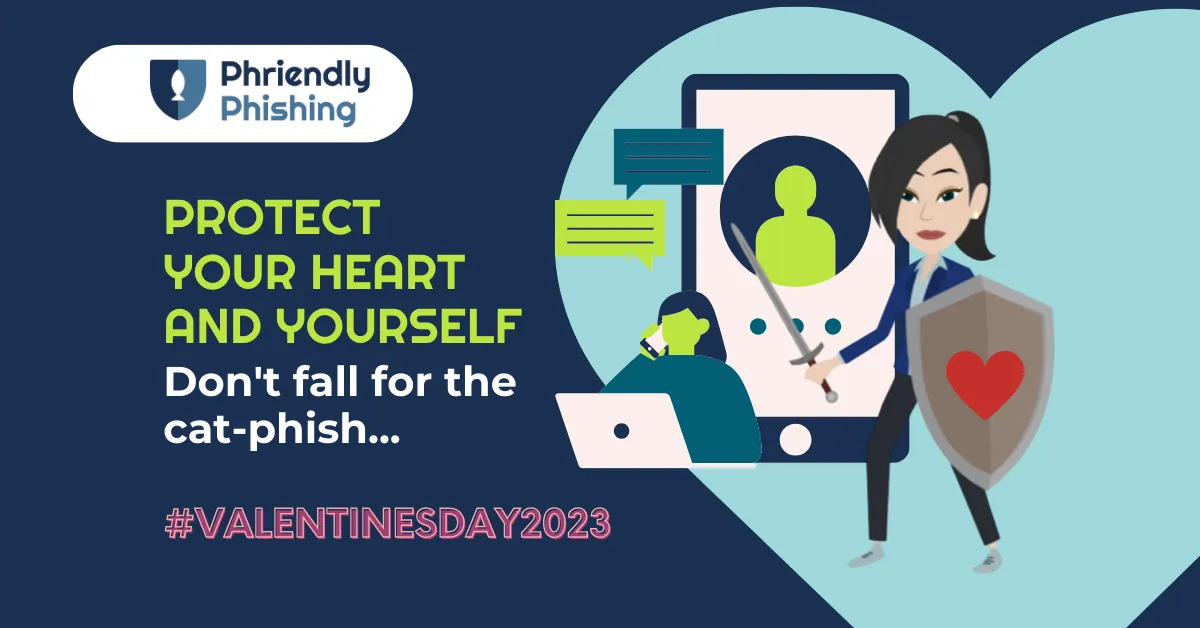Valentine’s Day is here! Love is in the air. Unfortunately, so are cyber criminals looking to take advantage of unsuspecting victims. According to Scamwatch, romance scams cost Australians over $33m in 2023. Here’s what you need to know about catfishing and phishing scams, how to spot them, and how to avoid them this Valentine’s season and beyond.
What is Catfishing?
Catfishing (or Catphishing) is when someone creates a false identity online to gain attention or money from unsuspecting victims, using romantic intentions as the way to the victim’s heart and wallet. They do this by creating fake profiles on social media sites or dating websites, pretending to be someone else to gain trust or sympathy. The goal of the catfish may vary; some are simply seeking attention while others are trying to scam their victims out of money or personal information.
The most common type of catfishing/phishing targets women looking for love on dating websites and apps like Tinder or Bumble, as well as bots or escort services scamming men. It can lead to large financial losses for those who fall victim to it, as well as emotional distress and trauma from being deceived by someone they thought was genuine. A common financial scam using this method is a long game. Chatting over text to foster the feeling of real relationship, meanwhile breadcrumbing information about investments or cryptocurrency.
How to spot a scammer
One of the best ways to spot a scammer is by paying attention to red flags. If your potential match seems too good to be true – if they claim to have a high-paying job but never talk about work, if they refuse video calls or insist on only talking over text messages and reply at odd times of the day or night – it’s likely that you’re dealing with someone who isn’t who they say they are. It doesn’t always mean they are a scammer, but hiding behind text for a long period of time shouldn’t be trusted, especially if the goal is to find a partner. Catfish scammers don’t often ask for money right away but watch out for any requests for a favour – this is the first step and called the ‘Benjamin Franklin Effect’ – once you do one favour for someone, you are more likely to do it again, and to a greater value.
If something isn’t adding up, do some research.
- Reverse Google search their images. It’s unlikely it’s the only place these are hosted, see if the images match up to another profile or that they match the name and details of what they have told you.
- Ask them local questions about the area they say they live or work in. Something that wouldn’t be obvious to an overseas scammer.

How to avoid getting caught in a scam
The best way to avoid getting caught in a scam is by being vigilant and staying informed about cyber security risks. Be wary of any unsolicited emails you receive from a dating match– especially those that ask you for personal information – and don’t click on links or attachments from them, even if you consider them a new friend or close relationship.
Things to look out for:
- They want to take the chat off the app and use WhatsApp or WeChat (so that you are unable to report them if it goes awry).
- Their answers on the dating app are similar or identical to another profile.
- They start talking about how much money they recently made in a sure investment.
- They change opinions slightly if you disagree with something, and then double down that they agree with you.
- Love bombing – they say everything right and promise a bright future in a quick time frame.
If your match is talking about material possessions, gifts, the promise of travel, marriage or investing for your future – it’s time to ask yourself why someone that you haven’t met is moving so fast. They might say all the right things, and it feels exciting! The harsh reality is that plans like this take time and trust, and it’s an almost zero percent chance that this is legitimate, so go slow and tread carefully.
It’s not just your money that is at risk in this situation. Some victims of catfishing scams have actually been arrested for money laundering, after a woman’s match on Tinder asked her to open an Australian bank account for his inheritance. It turned out to be used to deposit money from another cyber scam, so what starts as a traditional phishing or ransomware scam, is then laundered with a romance scam.
Valentine’s Day should be a time filled with smiles – not scammers’ grins! Understanding the dangers associated with catfishing scams can help protect yourself from becoming another statistic this year. Stay informed about current threats and always trust your intuition when interacting with strangers online – if something feels off then take steps at once such as reporting them or blocking their account right away! Remember: safety first!
For a more in depth, but bite sized training on phishing awareness and cyber scams, get in the know with our award-winning training; we’ll show you what to look out for! Schedule a demo now.

